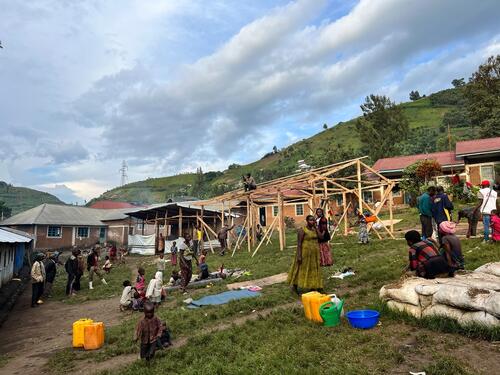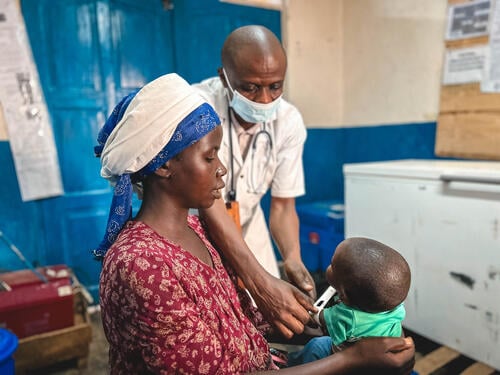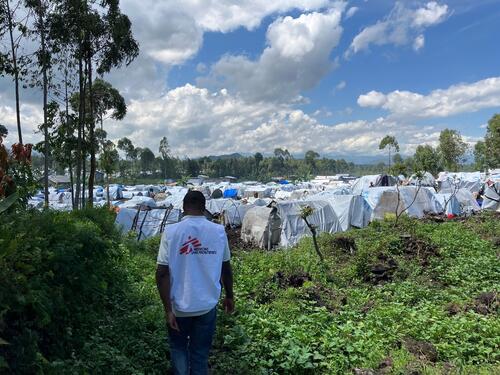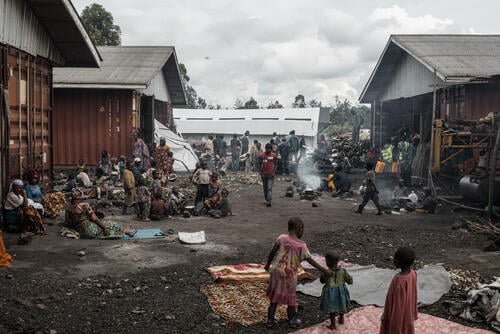More than 80,000 people have arrived in South Kivu’s Minova health zone, in eastern Democratic Republic of Congo (DRC), after fleeing conflict in neighbouring North Kivu province. Médecins Sans Frontières (MSF) has launched an emergency response with a focus on reaching people in areas where humanitarian assistance is non-existent.
When day breaks, Rehema mobilises the children. There is no time to lose. It takes them up to five hours to walk from Numbi to Kalungu, a town that connects Lake Kivu’s Littoral – the low-lying land along the lake’s shores – with the mountainous Hauts Plateaux area.
One of the older children carries baby Innocent, while Rehema and the other two teenagers carry the goods, usually sacks of coal. They leave Numbi and make their way across the hilly terrain, which is muddy after recent heavy rains. They cross green pastures and pass grazing cattle and groups of women carrying heavy boxes of beer on their backs supported by ropes looped around their foreheads.
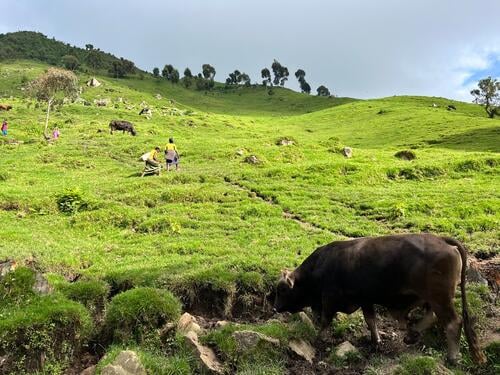
The commercial town of Kalungu is located at an important crossroads in the region, while Numbi is in the middle of an isolated region where even experienced motorbike riders have difficulties navigating its bumpy roads. But although Numbi is remote and its inhabitants are poor, the region is rich in coltan, a metallic ore essential to the manufacture of electronics.
At the end of the 10-hour return journey from Numbi to Kalungu, 35-year-old Rehema is tired out and her feet hurt. “It is very tiring as there are many steep hills, so by the time I get back, my feet are very painful,” says Rehema, who earns just 3,000 Congolese francs (US$1.5) per day for this work.
It covers her rent for the small clay-built room in Numbi where the family are staying. Its roof, covered with plastic sheeting, sticks and vegetation, lets in the water when it rains. “With the money that is left, I buy corn,” says Rehema. “Then, if there is anything over, I buy soap. I get crazy thinking that my children might go all night without having eaten.”
With the money that is left, I buy corn. I get crazy thinking that my children might go all night without having eaten.Rehema, 35, displaced person from North Kivu province
Escalating conflict
Rehema arrived in Numbi after fleeing the escalating conflict in neighbouring North Kivu province, which has forced some one million people from their homes over the past year. The majority have taken refuge in other areas of North Kivu, particularly on the outskirts of the provincial capital, Goma, but some 80,000 people have arrived also in South Kivu since early 2023, according to local authorities. Around one-third of these people have taken refuge in the Hauts Plateaux area, like Rehema and her family.
“We had heard that there were clashes, but we didn’t think they would reach [our hometown of] Rubaya,” says Rehema. “One day in February, I saw military men descending from the hill and there were gunshots. I didn’t want to wait for the violence to arrive. Hundreds of us left. I couldn’t take anything with me, only my four children.”
The displaced people sheltering in Numbi are largely invisible to outsiders, partly due to the lack of attention given to this crisis, but also because they are mostly living with host families or renting small rooms, rather than living in camps or informal sites. But despite their lack of visibility, their needs are significant, while the humanitarian assistance provided to them so far has been negligible.
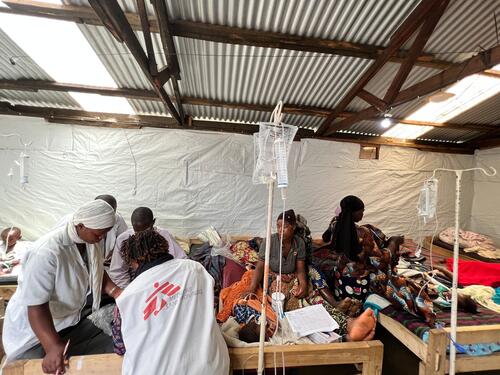
“The displaced people are living in extremely precarious conditions, compounded by a lack of space, inadequate hygiene and insufficient access to food,” says Ulrich Crépin Namfeibona, MSF’s emergency coordinator in South Kivu. “These factors combine to make them very vulnerable to disease.”
Sharing hospital beds
The hospital in Numbi, now receiving support from MSF, is overwhelmed with patients after recent weeks saw an explosion of measles cases across Minova health zone. There are three or even four children to a bed in most of the hospital’s rooms, despite the fact that bed capacity was recently increased. As well as measles patients, MSF teams are seeing high numbers of children with co-infections and a significant increase in cases of malnutrition.
“My youngest child is sick with measles and was admitted to Numbi hospital three days ago,” says Maniriho, 20, who was referred here by the health centre in Lumbishi, a village a few kilometres away.
“He is my third child to have caught the disease. I came because the service is free. I looked for a motorbike, but it was impossible to find a rider as the route is in very bad state due to the heavy rains. It took me the whole day to reach the hospital.”
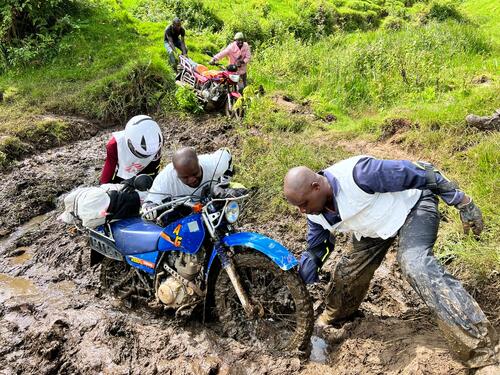
Maniriho comes from Masisi in North Kivu and arrived in the Hauts Plateaux in March, soon after her parents were killed. She is now staying in a small room in the town, along with her husband and four children. “We have no assistance, only what the church provides,” she says. “With the insecurity, I think it will be very complicated to return home anytime soon.”
Close by sits Josephine, 32, a widow with seven children from Walikale in North Kivu. Her youngest son, Valentin, was diagnosed with malaria and measles, but after six days in hospital his condition is improving and he is starting to eat again.
“At first I thought it was simple malaria and I gave him some medicines,” she says, “but he didn’t improve and that’s why I came to the hospital.”
It took Josephine and her children about a month to reach Numbi on foot after they fled the violence in North Kivu. “The children suffered a lot, their legs were swollen,” she says.
“On the way, an armed group took everything from us. Now all I have is what I am wearing. Here MSF provides us with food and soap, but after we are discharged, we will have no support,” she says, speaking in a low voice and wiping away tears.
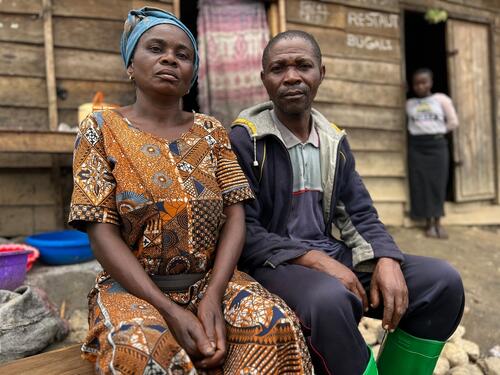
A constant cycle of violence and displacement
The recent conflict in North Kivu has aggravated a cycle of violence and displacement that has been almost constant over the past three decades in the eastern fringes of DRC. Here, dozens of armed groups with different interests and political affiliations fight each other, against or alongside Congolese armed forces (FARDC), with alliances that change over time.
Birandala and Riziki, a couple in their fifties, know this all too well. Over the past 25 years, they have had to flee their hometown five times, each time starting again from scratch, somewhere new.
“Every time we flee, we have always had to start again from zero,” says Birandala. “When you leave everything behind, the most important thing is to have good health, food and a place to sleep.
“At times we have gone several days without food or water, to the point where I thought I’d go mad. What gives us strength is the love that we have for each other and for our children. If I was able to send a message to the world, it would be that we need peace.”
MSF started working in Minova in December 2022, supporting health authorities by responding to a cholera epidemic. With the arrival of displaced people from North Kivu, we launched an emergency response in Minova health zone in late March 2023, covering both the Littoral and Hauts Plateaux areas.
Between late March and late May, MSF medical teams treated 2,019 patients, mostly children with measles, severe acute malnutrition and cholera, at the hospitals in Minova and Numbi. MSF water and sanitation teams have chlorinated water supplies to make it safe for drinking and constructed latrines and showers, mostly in sites hosting displaced people in Littoral.



